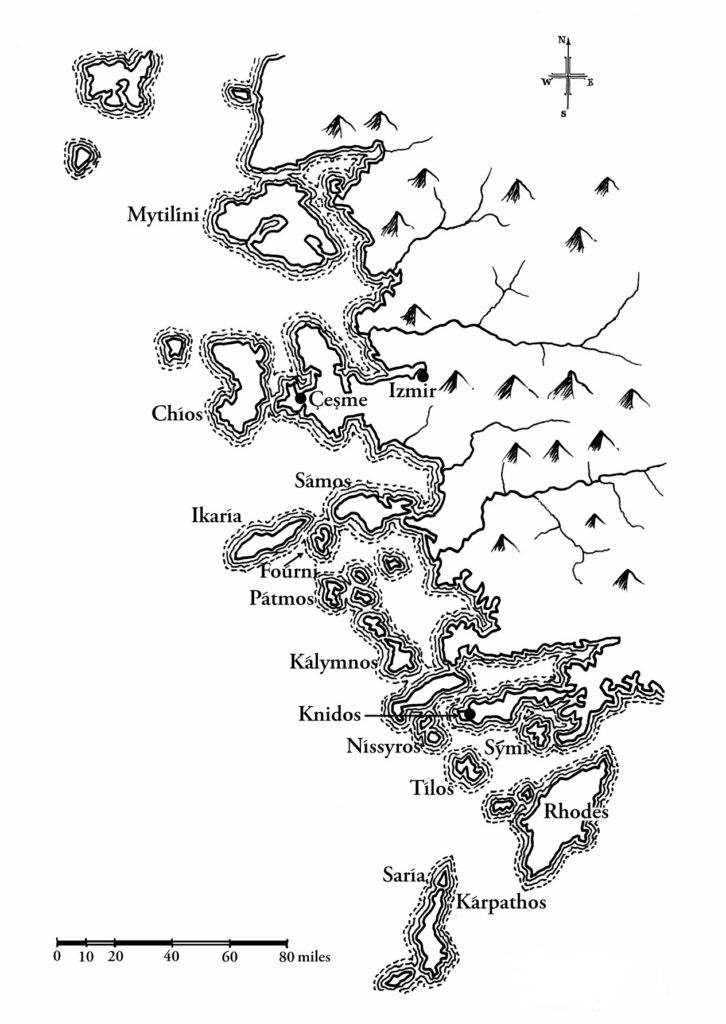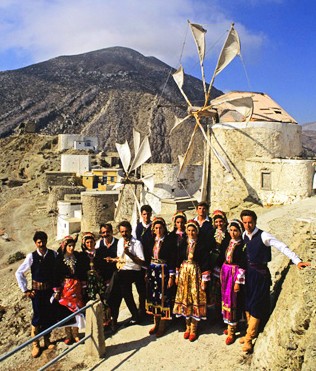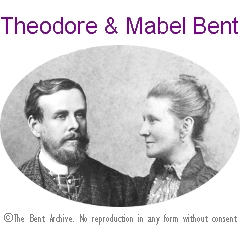
Easter time (April) 1885 found the Bents ‘excavating’ around Vroukoúnda on the Greek island of Kárpathos (Dodecanese). For the festivities, the couple (and their dragomános of choice, Matthew Símos) rode up to the major village of Ólymbos, then, as now, a preferred Easter destination for those in the know.
As usual, full details of their travels, travails and finds on this island can be read in Mabel’s relevant Chronicles and the many papers Theodore wrote (see bibliography). For a Cycladic Easter, a comprehensive good read is Theodore’s 1884 article ‘Easter Week in Amorgos’ first published in Macmillan’s Magazine (May/October issue) and included in his later book ‘The Cyclades – or Life Among the Insular Greeks‘.

Good Friday [April 3, 1885] was a fine sunny day and we unpacked the panniers, for we were quite too tired to look at anything on our arrival. It is very exciting work digging, first finding something, then is it whole? Then have we all the pieces? The men grind the edges trying to fit them and any metal they cut with their knife. Fortunately they never saw the little boxes. Theodore found and pocketed them…. These two days before Easter are employed making bread and cakes with red eggs stuck into them and every oven is smoking. Elymbo [Ólymbos, Kárpathos] is rather a disappointment to us; we think Méso Chório was a quainter place. This Saturday is a rainy day. Now here I must I think make a few remarks about the Greeks founded upon my 3 journeys amongst them and staying in the houses of high and low and seeing them in town and country.
Though they have a king, surely never were more true republicans than the Greeks. There appears to be perfect equality among them and a complete mingling of classes, neither dirt, poverty not want of education seems to make any difference… Mr. Philemon, who is the Greek Consul at Rhodes, and who is quite a gentleman and whose wife is quite a lady and very well dressed, has a most ragged and dirty old father-in-law, Dr. Klados, and no one would take Mrs. Klados for a lady… He lives with a mud floor. His daughter of 17 with bare legs carried our luggage about a mile for 6d on her head and one of his little boys I saw running about with only a tattered frock open all down the front and bare feet. He is quite one of the chief men of Karpathos and Mr. Sakolarides’s children also have bare legs. But these people are not like us in keeping up a good establishment in the country, for though they are as smart as possible in Athens, Syra, or Smyrna, once they get to the country they cast off their civilization with their collars and seem content with any kind of an untidy picnic for any length of time. Mr. Manolakakis has a cousin, a bricklayer, and one of our friends here is a bricklayer that Theodore met at Mr. Manolakakis’s house. He gave us letters of introduction to all kinds of peasants, some very dirty, but they all seem quite equal and we always noticed in the Cyclades that our muleteers used to sit down in any house and help themselves to tobacco. Certainly whatever their education is, they all seem to have good manners, if not quite according to our notion. We are expected to know any English engineer on any steamer, etc.; in fact they do not seem to recognize difference of rank at all. As to our being ‘a nation of shopkeepers’ the Greeks cannot understand our buying anything for ourselves and think every bit of embroidery and everything else is bought for sale, and they often ask us if we have different things with us to sell…
Every man but a priest or two and a few old men leaves the island every summer for 6 months or more, chiefly as bricklayers, and every field labour, wine making, etc., is done by the women. There are no girls’ schools and few of my sex can read.
Here the women’s dress consists of a pair of full white trousers and a white nightgown flowing open to the waist. When cold they wear a blue wadded-cotton coat, rather shorter, and then both men and women have a coat of brown goats’ hair with a hood. Sometimes they wear brown leather top boots, sometimes not…
Easter Sunday, April 5th 1885. This morning was sunny after the first two hours so we opened all our windows and the door and tried to dry our things. Though Theodore forgot to put out the brazier for the night and though it was still burning in the morning, some clean clothes hung over it on 2 chairs in the morning. We hung out the Union Jack in honour of the day. We had a visit from the schoolmaster, who is being doctored by us and is the better for our treatment, and took a walk with him. By the bye, one of Theodore’s patients (cold tea for the eyes) brought 2 eggs as a thank offering.
A little while after our return Manthaios came to say luncheon was ready if we were, for he thought it must be noon. Theodore looked at his watch and found it to be half past 10; however we agreed our appetites were ready, so to our amusement we found we had everything cleared away by 11.30.
We spoke over the difference we observed between the inhabitants of Karpathos and Tilos and the Cyclades and the other islands we have visited, i.e. Niseros, Rhodes, Chios, Samos, and Mytelene, in their not offering coffee, etc. to visitors. In the other islands we were always at once brought coffee, or jam and water, or raki, or almonds, oranges, or pomegranates, but here the only one who had offered us coffee was the Kaïmakan and the wicked owner of the plates who is a Greek from Syra. I agree with Theodore in thinking it a Turkish fashion, but it is odd they never have offered us any thing till about an hour or two after this conversation when we were asked into a house, which we entered, and very soon a large dish of sheep’s cream was placed before us and a kouloúri, that is one of the wound-up serpent-like cakes they make in great numbers for Easter, generally with coloured eggs in them. I could hardly get any down so soon and my horror was great when she said, ‘now you must eat some lamb!’
Such cooking is going on these 3 days. First bread and kouloúris, then yesterday and today lambs, and we see the lambs come out of the oven in every imaginable shape in which they may have been flung in. Well! She fetched the family lamb and tore us off bits. She handed me a whole leg, but I cried for mercy and was let off with a smaller bit. It was very tender and I gnawed away industriously till the kind woman took my bit and rubbed salt into it with her thumbs, having been to fetch a handful of salt. I managed to continue eating inside bits till, when everyone was excited over my gloves, I squeezed up my lamb and bread into a tight ball and pocketed it.
Since this we have been to church. Only men and little boys go into the church, the women remain in the outer room where the parliament was, but as I count as a man, sitting at meals, etc., they invited me in. In I went. All the little boys stood in front, some very small and very pretty – indeed there are lots of pretty children here, though their elders are not handsome.
Everyone but we had a candle, but just before the time for lighting them came a man with two very large ones, hot and newly made so that we were glad to have them in the tray in which they lay, they were so soft. Of course, when they were so kind we lit up like the rest and I consoled myself by remembering that it was in honour of a truly Christian feast in which we could take part, in fact we recognized many parts of our own service.
There were 5 priests with such dirty rough-shock heads of uncombed hair. Their poor robes were made of printed calico. People chatted a good deal and we often heard a loud ‘shsh!’ It was very odd seeing the priests dressing and undressing inside the tembelon or screen. They walked about a good deal in a way I could not understand and 2 or 3 young men stepped about with large prayer books and repeated ‘Christ is risen from the dead’ and wherever they went the bystanders looked over and raised their voices.
The gospel was read on this wise: one papas read a verse or two in Greek, then each of the other 4, and then a young man read them in French! We did not discover this till the very last set of verses, as the French was very bad, but the last set but one I began to suspect. Manthaios tells us each of the priests ought to have read in a different language if he could, Turkish, Arabic, etc., that all the world might understand. A very good idea I think.
After the service was over all the papas came out and, clearing away the candlesticks, etc. which stood in the way, and holding up a silver-bound gospel, cross, and other things, they stood in a row and the men who wished passed before them kissing each object in hand once, and the papas once on each cheek and on the mouth. We did not perform this ceremony.
When we got out there was a wonderful sort of a ‘guy’ set up over the gateway of the church to represent a Jew. His head was an earthen jar and he had a child in his arms. This the men shot at, getting nearer and nearer till he got on fire. I was sitting among the women who constantly begged me not to fear and thought I must be cold as I had on gloves, but I answered, ‘It is our custom’, which finishes off all discussions…
I think we have got to the end of our 7 days here and are no longer great wonders, but every Sunday we always are one of the amusements of the day…
